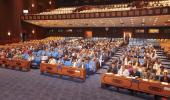Prime Minister Narendra Modi on Monday said he had an "excellent" meeting with his Nepalese counterpart Sher Bahadur Deuba in Lumbini -- the birthplace of Gautam Buddha -- and discussed the full range of bilateral relations as the two sides inked key MoUs to diversify and deepen cooperation.

Modi, who visited the Himalayan nation at the invitation of Deuba on a day-long visit to Lumbini on the occasion of Buddha Purnima, also discussed specific initiatives and ideas to further strengthen cooperation in various sectors, including culture, economy, trade, connectivity, energy and development partnership.
"Today's meeting with PM @SherBDeuba was excellent. We discussed the full range of relations between India and Nepal. Key MoUs were signed which will diversify and deepen cooperation," Modi tweeted.
The two sides signed six memorandums of understanding on cooperation in cultural and educational sectors.
"PM @narendramodi holds bilateral talks with PM @SherBDeuba in Lumbini. Opportunity to strengthen ongoing cooperation and develop new areas in our multifaceted partnership," ministry of external affairs spokesperson Arindam Bagchi tweeted at the start of the meeting.
During the meeting, both prime ministers followed up on their discussions held on April 2 in New Delhi.
"They discussed specific initiatives and ideas to further strengthen cooperation in various sectors, including culture, economy, trade, connectivity, energy and development partnership," the MEA said in a press release.
The two sides agreed in principle to establish sister city relations between Lumbini and Kushinagar, that are among the holiest sites of Buddhism and reflects the shared Buddhist heritage between the two countries, it added.
The two leaders expressed satisfaction at the progress made in bilateral power sector cooperation in recent months, that covers development of generation projects, power transmission infrastructure and power trade.
Prime Minister Deuba invited Indian companies to undertake the development of West Seti hydropower project in Nepal.
Modi assured India's support in the development of Nepal's hydropower sector and in encouraging interested Indian developers to expeditiously explore new projects in this regard.
Both prime ministers agreed to further expand educational and cultural exchanges to bring the people of the two countries closer.

The Indian Council of Cultural Relations inked separate MoUs with Lumbini Buddhist University on the establishment of Dr Ambedkar Chair for Buddhist Studies; with Tribhuvan University on the establishment of ICCR Chair of Indian Studies and with the Kathmandu University (KU) on the establishment of the ICCR Chair of Indian Studies.
An MoU between Kathmandu University and the Indian Institute of Technology Madras (IIT-M) was also signed. A letter of agreement between KU and IIT-M was signed for joint degree programme at the Master's level.
An agreement between Sutlej Jala Vidyut Nigam (SJVN), a subsidiary of the Himachal government, and Nepal Electricity Authority (NEA) for the development and implementation of Arun-4 Project was also inked.
The total installed capacity of the project, which was earlier 490.2 megawatts, now will be 695 megawatts. Nepal will receive 21.9 per cent, or 152 megawatts, of electricity free, as per the agreement. The project site is located on the lower side of the Arun-III hydroelectric project which is also currently being developed by SJVN.
Later, Deuba hosted a luncheon in honour of Prime Minister Modi.
"Today's visit has provided further momentum to the multifaceted partnership between the two countries and advanced cooperation in key areas, particularly in education, culture, energy and people to people exchanges," the MEA said.
Prime Minister Modi's visit to Lumbini also emphasises the deep and rich civilisational connect between India and Nepal and the contribution of people on both sides to foster and promote it.
Earlier, both prime ministers visited the Mayadevi temple, within which lies the birth place of Lord Buddha.
At the temple, they attended prayers conducted as per Buddhist rituals and made offerings. The prime ministers lit lamps and visited the historical Ashoka Pillar, that carries the first epigraphic evidence of Lumbini being the birthplace of Lord Buddha. They also watered the holy Bodhi tree that was brought as a gift by Prime Minister Modi during his visit to Nepal in 2014.
Prime Minister Modi together with Prime Minister Deuba also participated in the "shilanyas” ceremony for the construction of the India International Centre for Buddhist Culture and Heritage at a plot in Lumbini belonging to the International Buddhist Confederation (IBC) based in New Delhi.
Prime Minister Modi also unveiled a model of the Buddhist centre, which is envisaged as a net-zero compliant world-class facility that would house prayer halls, meditation centre, library, exhibition hall, cafeteria and other amenities and would be open to Buddhist pilgrims and tourists from around the world.
Earlier, welcoming Prime Minister Modi upon his arrival in Lumbini, Deuba said this was an important milestone for "our age-old cultural and people-to-people relations."
Addressing the International Buddhist Conference also attended by Prime Minister Modi, Deuba said that Nepal looks forward to strengthening its relations with India based on mutual respect and understanding.
He said Nepal greatly values India's cooperation in the development of infrastructure, connectivity, hydro-electricity, agriculture, human resources as well as post earthquake reconstruction and restoration of cultural heritage sites.
Nepal and India are tied to each other with common spiritual and cultural values and bonds, Deuba said.
He said the government of Nepal is grateful to the Government of India for its continued cooperation for the economic development of Nepal.
"Thank you, Shree @narendramodi Jee, for visiting Lumbini on #BuddhaPurnima today. I believe your special pilgrimage to the birthplace of Lord Buddha has further strengthened our friendship and cultural ties," he tweeted.
It was Prime Minister Modi's fifth visit to Nepal and the first to Lumbini.
Land-locked Nepal relies heavily on India for the transportation of goods and services.
Nepal's access to the sea is through India, and it imports a predominant proportion of its requirements from and through India.
The India-Nepal Treaty of Peace and Friendship of 1950 forms the bedrock of the special relations between the two countries.











 © 2025
© 2025